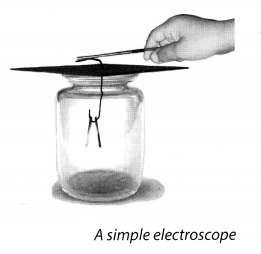Solutions For All Chapters Science Class 8
Select the correct option in Questions 1 and 2.
Question 1.
Which of the following cannot be changed easily by friction?
(a) A plastic scale
(b) A copper rod
(c) An inflated balloon
(d) A woolen cloth
Answer: (b) A copper rod
Question 2.
When a glass rod is rubbed with a piece of silk cloth the rod
(a) and the cloth both acquire a positive charge.
(b) becomes positively charged while the cloth has a negative charge.
(c) and the cloth both acquire a negative charge.
(d) becomes negatively charged while the cloth has a positive charge
Answer: (b) becomes positively charged while the cloth has a negative charge.
Question 3.
Write T against true and F against false in the following statements.
(a) Like charges attract each other.
(b) A charged glass rod attracts a charged plastic straw.
(c) Lightning conductor cannot protect a building from lightning.
(d) Earthquakes can be predicted in advance.
Answer:
(a) False
(b) True
(c) False
(d) False
Question 4.
Sometimes, a crackling sound is heard while taking off a sweater during winters. Explain.
Answer:
The electric discharge takes place between the body and the sweater due to friction. At the time of electric discharge some energy is released. In this case energy is released in the form of crackling sound.
Question 5.
Explain why a charged body loses its charge if we touch it with our hand.
Answer:
Human body is a conductor of electricity. When a charged body is touched with hand, our body conducts its charges to the earth. Hence, by this way charged body loses its charge.
Question 6.
Name the scale on which the destructive energy of an earthquake is measured. An earthquake measures 3 on this scale. Would it be recorded by a seismograph? Is it likely to cause much damage?
Answer:
The destructive energy of an earthquake is measured on a scale called the Richter Scale.
Yes, it would be recorded by seismograph because this scale has the readings from 1 to 10. No it is not likely to cause much damage as earthquakes of magnitude higher than 5 is considered destructive in nature.
Question 7.
Suggest three measures to protect ourselves from lightning.
Answer:
(i) Do not use TV or cable phone during lightning.
(ii) Stay indoor or under covered area.
(iii) Don’t take bath during lightning.
Question 8.
Explain why a charged balloon is repelled by another charged balloon whereas an uncharged balloon is attracted by another charged balloon?
Answer:
A charged balloon is repelled by another charged balloon because both carry same type of charges. On the other hand, an uncharged balloon is attracted by another charged balloon as they have opposite charges. We know that same charges repel and opposite charges attract each other.
Question 9.
Describe with the help of a diagram an instrument which can be used to detect a charged body.
Answer:
Electroscope is a device which is used to detect the charge on a body. It works on the principle that like charges repel each other while unlike charges attract each other. It consists of a metal rod with thin metal strip or leaf attached to it at the bottom.
At the top, the metal rod enters in a metallic cup or disc. The bottom of the rod and the metal leaf are enclosed in a glass box for protection. When the disc of the electroscope is touched with a charged ebonite or glass rod, the metal leaves open out or diverge.
The extent of divergence depends upon the amount of charge on the electroscope. When the metal strips repel each other proves that the body is charged because repulsion is the sure test to detect that body is charged or not through an electroscope.
Question 10.
List three states in India where earthquakes are more likely to strike.
Answer: Kashmir, Rajasthan and Gujarat.
Question 11.
Suppose you are outside your home and an earthquake strikes. What precaution would you take to protect yourself?
Answer:
We will take the following precautions to protect ourselves:
(i) Move to open space. Find a clean spot away from buildings, trees and overhead power lines. Drop to the ground.
(ii) If we are in a car or a bus, will not come out. Drive slowly to a clear spot and remain in it till the earthquake stops.
Question 12.
The weather department has predicted that a thunderstorm is likely to occur on a certain day. Suppose you have to go out on that day. Would you carry an umbrella? Explain.
Answer:
No, it is not advisable to carry an umbrella at all. Its metallic objects are more prone to lightning stroke. So an umbrella increases the risk.


I take good knowledge with your app e-vidyarthi
Q-1- write the answer
Thanks sir 🙏 ☺️ 😊 🙌 👍 🙂 🙏 ☺️ 😊 🙌 👍 🙂 🙏 ☺️ 😊 🙌 by me